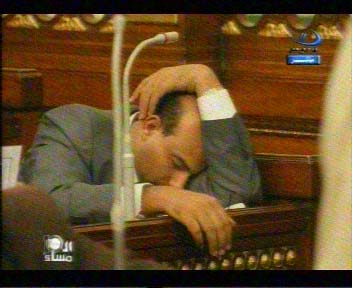 This is the sixth year in a row that I write, following the conclusion of the annual parliamentary round, to comment on the failure of the Parliament to pass the unified law for places of worship. The lack of such a law, as any casual observer can tell, has been behind countless incidents of violence against Copts—incidents we could very well have escaped and for which our government should be held accountable.
This is the sixth year in a row that I write, following the conclusion of the annual parliamentary round, to comment on the failure of the Parliament to pass the unified law for places of worship. The lack of such a law, as any casual observer can tell, has been behind countless incidents of violence against Copts—incidents we could very well have escaped and for which our government should be held accountable.
For the sixth year in a row
Youseef Sidhom
Opinion
00:08
Sunday ,08 August 2010

The bill for unified regulations for building places of worship was first drafted by MP Mohamed al-Guweili in 2004, and was directly approved by Parliament’s Committee for Proposals and Complaints. It was then referred to the Building Committee where it still lies, awaiting placement on the government’s legislative agenda. Inexplicably, the government has chosen to disregard the bill which, had it been passed into a law, would have undoubtedly spared us countless incidents of violence related to the need of Copts to build new churches, or expand or restore existing ones. The State-affiliated National Council for Human Rights (NCHR) has made repeated calls for the passage of the law, but to no avail. It was not lost upon the NCHR that the absence of the law was the main culprit behind the prevalent inflamed climate of tension between Copts and Muslims, and between Copts and the civil administration and security authority.
The NCHR is not alone in demanding the passage of the law; Egyptian rights groups, intellectuals, activists, and those concerned about the social peace of Egypt, have all called for its passage. They warned that the current situation implies the State is happy with the inequality between Egyptian Muslims and Christians. The perfect ease with which Muslims can build or restore a mosque is countered with the near impossibility of Christians building or restoring a church.
In its fact-finding report on the Nag Hammadi crime against Copts earlier this year, the NCHR stressed the need to pass the unified law for places of worship, as a gesture by the State that the equality of Egyptians, stipulated clearly by the Constitution, is a reality on the ground. The former deputy to the secretary-general of the NCHR, Mr Kamal Abul-Magd, declared that, even though he was not confident the unified law would solve all problems relating to churches, he strongly called for its passage. “The State’s procrastination in passing the law,” he said, “implies it condones inequality between Muslims and Copts … a fact which carries damaging implications.” For his part, the head of the Foreign Affairs committee in Parliament, Dr Mustafa al-Fiqi said that the unified law, once passed, could resolve up to 50 per cent of Egypt’s sectarian problems. It would moreover clear the State of the claim of condoning discrimination.
State officials, however, appeared to have no clear vision. Minister of State for Parliamentary Affairs Mufid Shehab said the time was not right to pass the unified law, but never indicated why it was not right nor when would be the right time. Minister of Religious Endowments Hamdi Zaqzouq said the bill would be discussed by Parliament in the future round. The scene was so replete with confusion that the sarcastic writer Ahmed Ragab scorned: “Why does the government see the citizenship clause in the Constitution as mere ink on paper? Top posts in the State are monopolised by Muslims, and the unified law for places of worship is shelved ... If the government has donned the Islamist look of the beard and the prayer bump zebiba and branding non-Muslims as apostates, why does not Interior Minister Habib al-Adli detain the government as he does extremist Muslims?”
In the meantime, the Egyptian Initiative for Personal Rights issued its annual report on the human rights situation in Egypt in 2008/2009. In almost unprecedented candour, the report monitored the accelerating church-building-related violence against Copts and linked it to the general climate of discrimination on the popular, official, and security levels. It was amazing, however, that the report, despite its unique realism and fairness, did not refer to the need for a unified law for places of worship. The explanation for the remission was even more stunning; those in charge of the EIPR said the report stood a better opportunity for consideration by the policy makers if it did not allude to the bill.
Now that the parliamentary round is over, Parliament has again failed to pass the bill. In two months’ time Egypt will embark upon electing a new Parliament. Will the new Parliament pass the unified law for places of worship or will it follow in the footsteps of it predecessor, and we would again have to write every year reminding of the momentous failure?



